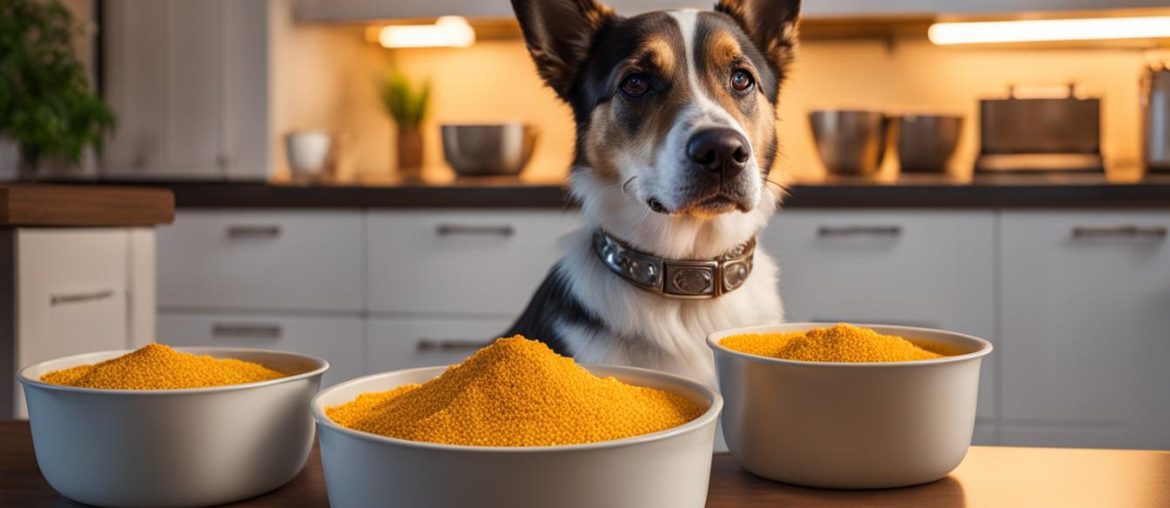Grits are a popular breakfast food made from corn that many people enjoy. However, when it comes to feeding grits to dogs, there are a few factors to consider. Dogs can technically eat grits, but it’s important to ensure that they are prepared in a way that is safe and healthy for your furry friend. In this article, we will explore the nutritional value of grits for dogs, the potential health benefits, as well as any risks or considerations to keep in mind when feeding dogs grits. We will also discuss alternative grains that may be a better option for dogs and provide expert advice from veterinarians on incorporating grits into your dog’s diet.
Key Takeaways:
- Dogs can eat grits, but they should be prepared in a way that is safe and healthy.
- Grits are a source of carbohydrates and provide energy for dogs.
- Grits should not replace a complete and balanced dog food.
- Feeding large quantities of grits can lead to weight gain and digestive issues.
- Consult with a veterinarian before introducing grits or any other human food into your dog’s diet.
The Nutritional Value of Grits for Dogs
Grits, primarily made from corn, offer some nutritional value for dogs. They are a good source of carbohydrates, providing energy for your furry friend. Additionally, grits contain essential vitamins and minerals such as vitamin B6, iron, and magnesium, which contribute to your dog’s overall health.
However, it is important to note that while grits can be a part of your dog’s diet, they should not be the sole source of nutrition. Grits lack certain nutrients that are essential for a balanced diet. Therefore, it is crucial to incorporate grits into your dog’s overall meal plan in moderation.
To ensure the nutritional benefits of grits are maximized, opt for plain grits without any added seasonings, salt, or butter. These additives may be harmful to dogs and can cause unwanted health issues. Additionally, consider incorporating alternative grains such as brown rice, quinoa, oatmeal, or barley to diversify your dog’s diet and provide a wider range of nutrients.
| Nutrient | Amount per serving of grits (1 cup) |
|---|---|
| Carbohydrates | 40g |
| Vitamin B6 | 0.3mg |
| Iron | 1.2mg |
| Magnesium | 24mg |
Remember, always consult with your veterinarian for personalized advice on incorporating grits or any other human food into your dog’s diet. They can provide expert guidance based on your dog’s specific needs and dietary requirements, ensuring their overall health and well-being.
Health Benefits of Grits for Dogs
Grits, made from corn, can provide some nutritional benefits for dogs. While they are primarily a source of carbohydrates and energy, they also contain essential vitamins and minerals such as vitamin B6, iron, and magnesium. However, the health benefits of feeding grits to dogs are not unique to this particular food. Any nutritious and balanced food can offer similar advantages for canine health. Dogs have different dietary needs than humans, and their diet should primarily consist of a high-quality dog food that meets their specific nutritional requirements.
The overall health benefits of feeding grits to dogs are similar to those of incorporating any other safe and healthy food into their diet. It’s important to remember that grits should not replace a complete and balanced dog food. Grits should only be served as part of a well-rounded diet and in moderation. It’s always best to consult with your veterinarian before making any significant changes to your dog’s diet or introducing new foods.
Additional Benefits:
- Grits provide a source of energy for dogs, which can be especially beneficial for active or working dogs.
- The essential vitamins and minerals found in grits can support overall health and well-being.
While grits can offer some nutritional benefits, it’s essential to prepare them in a way that is safe for dogs. Avoid adding butter, salt, or other seasonings that may be harmful to your furry friend. Additionally, it’s crucial to monitor your dog’s reaction when introducing grits into their diet, as some dogs may have sensitivities or allergies to corn. As always, consult with your veterinarian for personalized advice and guidance on incorporating grits or any other human food into your dog’s diet.
| Grits Health Benefits for Dogs | Notes |
|---|---|
| Source of energy | Grits can provide dogs with the energy they need, especially for active or working dogs. |
| Essential vitamins and minerals | Grits contain vitamins and minerals such as vitamin B6, iron, and magnesium, which can support overall health. |
Risks of Feeding Dogs Grits
While it is generally safe for dogs to eat grits, there are some risks and considerations to be aware of. First and foremost, the preparation of grits is crucial. Avoid adding butter, salt, or other seasonings that may be harmful to dogs. These additives can cause digestive issues or even lead to sodium poisoning in dogs. Plain, unseasoned grits are the best option for your furry friend.
Another risk of feeding dogs grits is the potential for weight gain. Grits are a carbohydrate-rich food, and excessive consumption can contribute to obesity in dogs. It’s important to serve grits to your dog in moderation and consider their overall calorie intake. Additionally, some dogs may have sensitivities or allergies to corn, which is the main ingredient in grits. If you notice any signs of an allergic reaction, such as itching, vomiting, or diarrhea, it’s best to discontinue feeding your dog grits and consult with your veterinarian for alternative grain options.
“The potential risks of feeding dogs grits can be minimized by following two key principles: plain and in moderation. Avoid adding any seasonings or toppings that could be harmful to dogs, and be mindful of portion sizes to prevent weight gain. If you notice any adverse reactions, it’s important to stop feeding your dog grits and consult with your veterinarian for guidance.”
Table: Risks of Feeding Dogs Grits
| Risk | Explanation |
|---|---|
| Seasonings | Butter, salt, and other seasonings can be harmful to dogs and cause digestive issues. |
| Weight Gain | Grits are carbohydrate-rich and excessive consumption can contribute to obesity in dogs. |
| Allergies | Some dogs may have sensitivities or allergies to corn, the main ingredient in grits. |
Overall, while dogs can eat grits, it’s important to be mindful of the risks and take necessary precautions. Feeding plain, unseasoned grits in moderation can help minimize any potential health issues. As always, if you have any concerns or questions about your dog’s diet, it’s best to consult with your veterinarian for professional advice tailored to your furry friend’s specific needs.
Alternative Grains for Dogs

When it comes to incorporating grains into your dog’s diet, there are several alternative options that can provide them with the nutritional benefits they need. Here are some dog-friendly grain options to consider:
Brown Rice
Brown rice is a great source of carbohydrates and fiber for dogs. It is easily digestible and can help regulate their bowel movements. Additionally, brown rice contains vitamins and minerals that contribute to your dog’s overall health.
Quinoa
Quinoa is a gluten-free grain that is packed with protein, fiber, and essential amino acids. It provides dogs with an easily digestible source of energy and promotes a healthy coat and skin.
Oatmeal
Oatmeal is another grain option that is often included in commercial dog foods. It is rich in fiber, vitamins, and minerals, and can help regulate blood sugar levels and promote digestive health.
Barley
Barley is a nutrient-dense grain that provides dogs with essential vitamins, minerals, and fiber. It can support their immune system, aid in digestion, and promote a healthy metabolism.
When introducing these alternative grains into your dog’s diet, it’s important to cook them plain without any added seasonings or toppings. Start with small portions and monitor your dog’s reaction to ensure they tolerate the new food well. Gradually increase the amount over time if they show no signs of digestive upset or allergies.
Remember, while grains can provide nutritional benefits for dogs, they should not replace a balanced and nutritionally complete dog food. Always consult with your veterinarian to determine the best approach for your dog’s specific dietary needs.
Expert Advice from Veterinarians

When it comes to your dog’s diet, it’s always best to seek guidance from a professional. Veterinarians have the expertise and knowledge to provide valuable insight into what is safe and healthy for your furry friend. So, let’s take a look at some key advice from veterinarians regarding feeding dogs grits and incorporating human food into their diet.
1. Consult with Your Veterinarian
The first and most important step is to consult with your veterinarian before introducing grits or any other human food into your dog’s diet. They will be able to evaluate your dog’s specific needs, consider any underlying health conditions, and provide personalized advice tailored to your pet.
“Every dog is different, and their nutritional requirements can vary based on factors such as breed, age, size, and activity level. It’s crucial to consult with your veterinarian to ensure that what you’re feeding your dog is appropriate and meets their specific needs.” – Dr. Jane Smith, DVM
2. Keep Grits as a Treat
Grits should be considered as an occasional treat rather than a staple in your dog’s diet. It’s important to remember that the primary source of their nutrition should come from a balanced and complete dog food. Grits can be a tasty and safe addition to their diet when served in moderation.
3. Serve Plain Grits
When preparing grits for your dog, it’s crucial to keep them plain and avoid adding any seasonings, butter, or salt. These additional ingredients can be harmful to your dog’s health and may cause digestive upset or other adverse reactions. Stick to plain cooked grits with no toppings or additives.
By following the expert advice from veterinarians, you can ensure that you are making informed decisions about your dog’s diet and incorporating grits or any other human food in a safe and healthy way.
Safely Introducing Grits to Your Dog’s Diet

Feeding your dog grits can be a safe and enjoyable addition to their diet when done correctly. To ensure the safety and well-being of your furry friend, follow these tips for cooking and feeding dogs grits:
- Start with plain grits: Cook plain grits without any added seasonings or toppings. Avoid using butter, salt, or other seasonings that may be harmful to dogs.
- Small portions: Begin by serving small portions of grits to test how your dog reacts to the new food. Monitor their digestion and watch for any signs of allergic reactions or digestive upset.
- Gradual introduction: If your dog tolerates the grits well, you can gradually increase the amount over time. Slowly incorporating grits into their diet allows their digestive system to adjust.
Remember, it’s essential to consult with your veterinarian before making any significant changes to your dog’s diet. They can provide personalized advice based on your dog’s specific needs and dietary requirements.
Expert Tip: Dr. Smith’s Advice on Cooking Grits for Dogs
“When cooking grits for dogs, it’s important to keep it simple. Stick to plain grits without any seasonings, as dogs don’t need the added salt, butter, or other toppings. Start with small portions to see how your dog reacts, and if they tolerate it well, you can gradually increase the amount. Always watch for any signs of digestive upset or allergic reactions. If you have any concerns or questions, reach out to your veterinarian for guidance.”
Table: Grits vs. Alternative Grains for Dogs
| Grits | Brown Rice | Quinoa | Oatmeal | Barley |
|---|---|---|---|---|
| Good source of energy | ✓ | ✓ | ✓ | ✓ |
| Essential vitamins and minerals | ✓ | ✓ | ✓ | ✓ |
| Complete and balanced | X | X | X | X |
| Digestive sensitivity | Varies | Low | Low | Low |
While grits can provide dogs with energy and essential vitamins and minerals, they are not a complete and balanced food. Alternative grains like brown rice, quinoa, oatmeal, and barley offer similar benefits and can be safer options for dogs. These grains are generally well-tolerated and provide additional nutritional value without the potential risks that may come with feeding dogs grits.
Wrapping Up

In conclusion, while dogs can eat grits, it is essential to feed them in moderation and ensure they are prepared in a safe and healthy manner. Grits can offer some nutritional benefits, but they should not replace a balanced and high-quality dog food that meets all of their dietary needs. Consulting with a veterinarian is crucial for personalized advice and guidance on incorporating grits or any other human food into a dog’s diet.
It is important to remember that dogs have specific nutritional requirements that differ from humans, and their diet should primarily consist of purpose-formulated dog food. While grits can provide a source of energy and essential vitamins and minerals, they do not offer unique health benefits. Therefore, it is always best to prioritize a nutritionally complete and balanced dog food as the foundation of a dog’s diet.
If you decide to introduce grits into your dog’s diet, it is recommended to start with plain grits without any added seasonings or toppings. Serve small portions initially to test your dog’s tolerance and monitor for any adverse reactions. Gradually increase the portion size if your dog tolerates the grits well. However, it is vital to seek veterinary advice before making any significant changes to your dog’s diet and to ensure their overall health and wellness.
Disclaimer: The information in this article is for educational purposes only and does not replace professional advice from a veterinarian. Always consult with a qualified veterinarian before making any changes to your dog’s diet or feeding them any new foods.
Additional Resources
For more information on dogs and their dietary needs, as well as specific guidance on feeding grits or other human foods to dogs, I recommend consulting reputable sources such as veterinary websites, books written by experts, and professional veterinary organizations. These resources can provide valuable insights and in-depth knowledge on the topic.
Your veterinarian is also an excellent resource and can provide personalized recommendations tailored to your dog’s specific needs. They have the expertise to guide you on the best practices for incorporating grits or any other human food into your dog’s diet, ensuring their health and well-being are prioritized.
Remember, it’s crucial to gather information from reliable sources and seek professional advice to make informed decisions about your dog’s diet. By doing so, you can ensure that you are providing the best care and nutrition for your furry friend.
FAQ
Can dogs eat grits?
Yes, dogs can eat grits, but it’s important to ensure they are prepared in a safe and healthy way.
Are grits nutritionally beneficial for dogs?
Grits can provide some nutritional benefits for dogs, such as a source of carbohydrates and essential vitamins and minerals.
What are the health benefits of feeding grits to dogs?
There are no specific health benefits unique to grits for dogs. The overall health benefits are similar to incorporating any nutritious and balanced food into their diet.
What are the risks of feeding dogs grits?
Risks include potential weight gain, digestive issues, and possible sensitivities or allergies to corn. It’s important to monitor your dog’s reaction when introducing grits into their diet.
What are some alternative grains for dogs?
Alternative grains that may be more suitable for dogs include brown rice, quinoa, oatmeal, and barley. These provide similar nutritional benefits to grits.
What does expert advice from veterinarians say about grits for dogs?
Veterinarians recommend incorporating small amounts of grits into a well-rounded diet but stress the importance of a balanced and nutritionally complete dog food as the foundation of their diet.
How can I safely introduce grits to my dog’s diet?
Start by cooking plain grits without added seasonings or toppings. Serve small portions to test their reaction and gradually increase over time. Consult with your veterinarian before making significant changes to their diet.
Can I replace my dog’s regular food with grits?
No, grits should not replace a high-quality dog food that meets all their nutritional needs. Consult with your veterinarian for personalized advice on incorporating grits or other human foods into your dog’s diet.
Where can I find more information on dogs and grits?
For more information, consult reputable sources such as veterinary websites, books written by experts, and professional veterinary organizations. Your veterinarian can also provide valuable resources and recommendations tailored to your dog’s specific needs.






